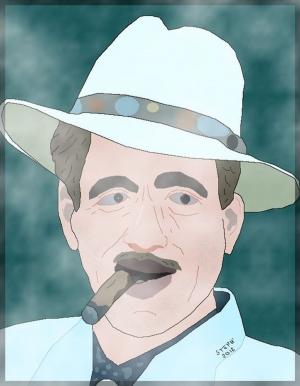| Author: | Fyodor Dostoyevsky | ISBN: | 9786050415094 |
| Publisher: | Fyodor Dostoyevsky | Publication: | September 11, 2015 |
| Imprint: | Language: | English |
| Author: | Fyodor Dostoyevsky |
| ISBN: | 9786050415094 |
| Publisher: | Fyodor Dostoyevsky |
| Publication: | September 11, 2015 |
| Imprint: | |
| Language: | English |
Fyodor Mikhailovich Dostoyevsky[a] (/ˌdɒstəˈjɛfski, ˌdʌs-/;[1] Russian: Фёдор Миха́йлович Достое́вский; IPA: [ˈfʲɵdər mʲɪˈxajləvʲɪtɕ dəstɐˈjɛfskʲɪj] ( listen); 11 November 1821 – 9 February 1881),[b] sometimes transliterated Dostoevsky, was a Russian novelist, short story writer, essayist, journalist and philosopher. Dostoyevsky's literary works explore human psychology in the troubled political, social, and spiritual atmosphere of 19th-century Russia. Many of his works are marked by a preoccupation with Christianity, explored through the prism of the individual confronted with life's hardships and beauty. He began writing in his 20s, and his first novel, Poor Folk, was published in 1846 when he was 25. His major works include Crime and Punishment (1866), The Idiot (1869), Demons (1872) and The Brothers Karamazov (1880). His output consists of 11 novels, three novellas, 17 short novels and numerous other works. Many literary critics rate him as one of the greatest psychologists in world literature.[2] His 1864 novella Notes From Underground is considered to be one of the first works of existentialist literature.
Born in Moscow in 1821, Dostoyevsky was introduced to literature at an early age through fairy tales and legends, and through books by Russian and foreign authors. His mother died in 1837, when he was 15, and around the same time he left school to enter the Nikolayev Military Engineering Institute. After graduating, he worked as an engineer and briefly enjoyed a lavish lifestyle, translating books to earn extra money. In the mid-1840s he wrote his first novel, Poor Folk, which gained him entry into St. Petersburg's literary circles. In 1849 he was arrested for his involvement in the Petrashevsky Circle, a secret society of liberal utopians that also functioned as a literary discussion group; they were particularly interested in the works of Charles Fourier.[3] He and other members were condemned to death, but at the last moment, a note from Tsar Nicholas I was delivered to the scene of the firing squad, commuting the sentence to ten years' hard labour in Siberia. His seizures, which may have started in 1839, increased in frequency there, and he was diagnosed with epilepsy. On his release, he was forced to serve as a soldier, before being discharged on grounds of ill health. In the following years, Dostoyevsky worked as a journalist, publishing and editing several magazines of his own and later A Writer's Diary, a collection of his writings. He began to travel around western Europe and developed a gambling addiction, which led to financial hardship. For a time, he had to beg for money, but he eventually became one of the most widely read and highly regarded Russian writers. His books have been translated into more than 170 languages. Dostoyevsky influenced a multitude of writers and philosophers, from Anton Chekhov and Ernest Hemingway to Friedrich Nietzsche and Jean-Paul Sartre (font: Wikipedia)
Fyodor Mikhailovich Dostoyevsky[a] (/ˌdɒstəˈjɛfski, ˌdʌs-/;[1] Russian: Фёдор Миха́йлович Достое́вский; IPA: [ˈfʲɵdər mʲɪˈxajləvʲɪtɕ dəstɐˈjɛfskʲɪj] ( listen); 11 November 1821 – 9 February 1881),[b] sometimes transliterated Dostoevsky, was a Russian novelist, short story writer, essayist, journalist and philosopher. Dostoyevsky's literary works explore human psychology in the troubled political, social, and spiritual atmosphere of 19th-century Russia. Many of his works are marked by a preoccupation with Christianity, explored through the prism of the individual confronted with life's hardships and beauty. He began writing in his 20s, and his first novel, Poor Folk, was published in 1846 when he was 25. His major works include Crime and Punishment (1866), The Idiot (1869), Demons (1872) and The Brothers Karamazov (1880). His output consists of 11 novels, three novellas, 17 short novels and numerous other works. Many literary critics rate him as one of the greatest psychologists in world literature.[2] His 1864 novella Notes From Underground is considered to be one of the first works of existentialist literature.
Born in Moscow in 1821, Dostoyevsky was introduced to literature at an early age through fairy tales and legends, and through books by Russian and foreign authors. His mother died in 1837, when he was 15, and around the same time he left school to enter the Nikolayev Military Engineering Institute. After graduating, he worked as an engineer and briefly enjoyed a lavish lifestyle, translating books to earn extra money. In the mid-1840s he wrote his first novel, Poor Folk, which gained him entry into St. Petersburg's literary circles. In 1849 he was arrested for his involvement in the Petrashevsky Circle, a secret society of liberal utopians that also functioned as a literary discussion group; they were particularly interested in the works of Charles Fourier.[3] He and other members were condemned to death, but at the last moment, a note from Tsar Nicholas I was delivered to the scene of the firing squad, commuting the sentence to ten years' hard labour in Siberia. His seizures, which may have started in 1839, increased in frequency there, and he was diagnosed with epilepsy. On his release, he was forced to serve as a soldier, before being discharged on grounds of ill health. In the following years, Dostoyevsky worked as a journalist, publishing and editing several magazines of his own and later A Writer's Diary, a collection of his writings. He began to travel around western Europe and developed a gambling addiction, which led to financial hardship. For a time, he had to beg for money, but he eventually became one of the most widely read and highly regarded Russian writers. His books have been translated into more than 170 languages. Dostoyevsky influenced a multitude of writers and philosophers, from Anton Chekhov and Ernest Hemingway to Friedrich Nietzsche and Jean-Paul Sartre (font: Wikipedia)















